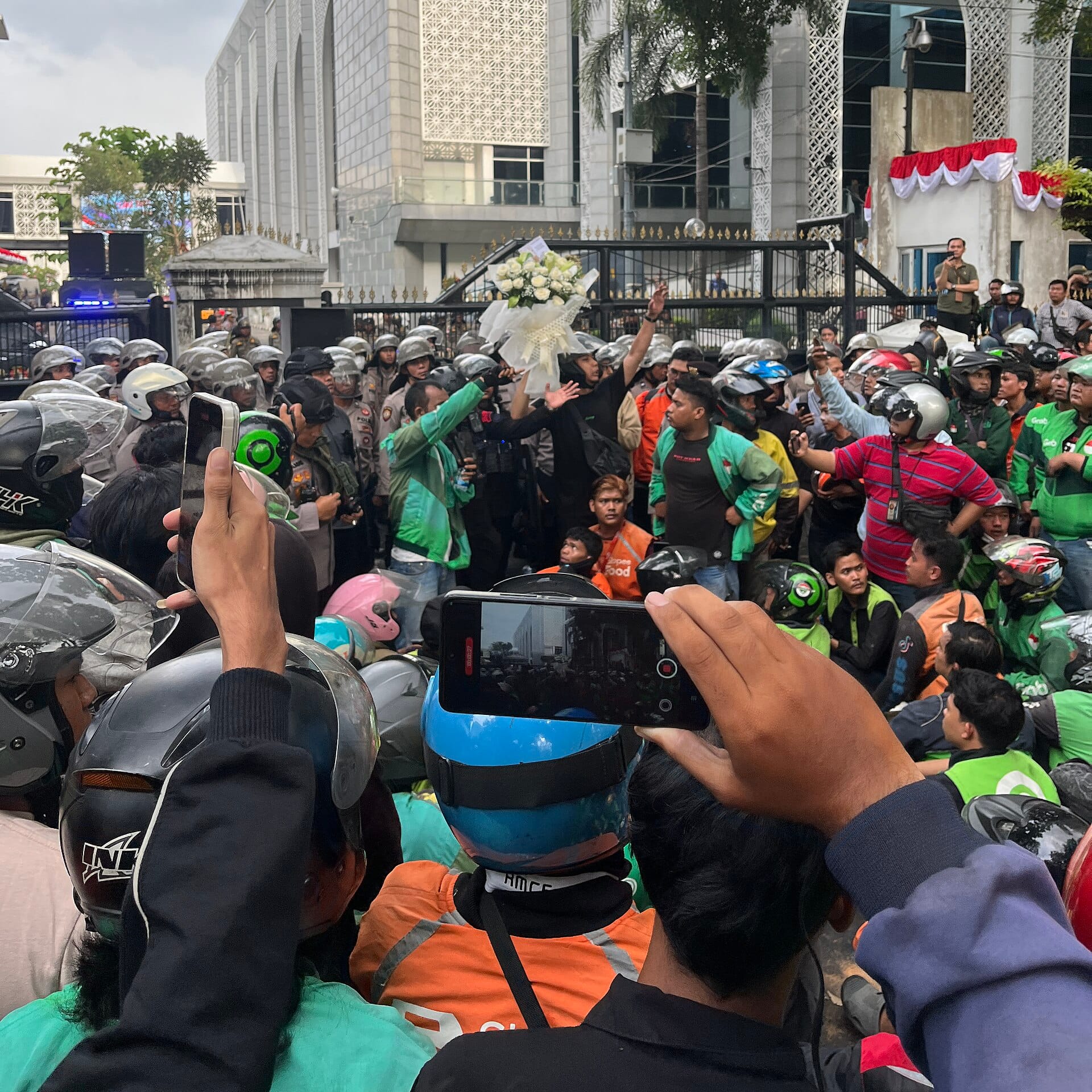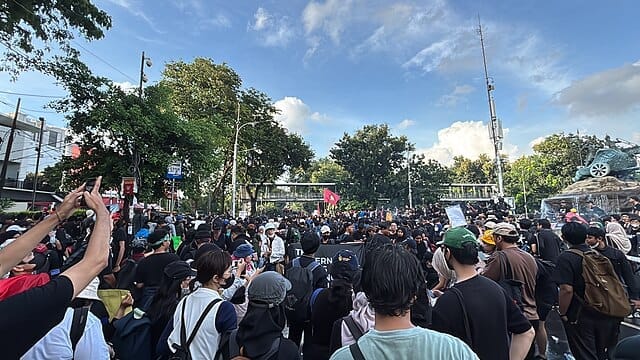Notes on class struggle in Indonesia
Meanwhile, online criticism mounted over the behavior of government officials. A video showing Coordinating Minister for Human Development Pratikno laughing when questioned about a child’s death from severe worm infection sparked outrage.

By Paul O’Banion
Less than a year after taking office, Indonesian president Prabowo Subianto is facing the most militant anti-government protests in years. Recent street actions are driven by the country’s extreme inequality and the dominance of an entrenched political class. While the middle class is shrinking, the elite is becoming ever more wealthy. The parliament recently voted themselves a substantial hike in monthly housing allowances, bringing their total income to more than Rp100 million (over US$6,000). By contrast, average monthly wages are about Rp3–4 million (roughly US$180–250, depending on sector and exchange rates). Indonesia’s overall unemployment rate is around 4–5%, though youth joblessness is far higher—among the steepest in Southeast Asia.
On Thursday morning, August 28, labor unions peacefully assembled outside the parliament building to call for higher wages, tax reform and adherence to existing labor laws. After workers dispersed, students surged around the building, demanding cancellation of politicians’ new housing allowances and dissolution of parliament. That night, Affan Kurniawan, a 21-year-old Ojek driver (an online motorcycle delivery/taxi service), was struck and killed by a police armored vehicle during the Jakarta protest; seven Brimob officers were later detained for ethics violations connected to the incident. A co-worker suffered a broken leg.
Prabowo, who was discharged from the army in 1998 after an inquiry into the kidnapping of pro-democracy activists—a role he has acknowledged while saying he acted under orders—claimed to be “shocked and amazed” by the death of the Ojek driver. He urged calm and ordered an investigation into “ethical” issues surrounding Affan’s death. The sudden eruption of militant actions across the country compelled him to visit the driver’s family and promise that they would be supported by the government. Affan’s funeral procession drew hundreds of green-uniformed Ojek drivers.
Class Struggle
These marginalized workers daily confront Indonesia’s stark inequality. They pick up food at luxurious malls and deliver it to middle-class homes, often under grueling conditions. Their financial situation is so precarious that on December 8, 2024, Darwin Mangudut Simanjutak starved to death in Medan while waiting for a customer’s order. Six months later, on May 20, 2025, thousands of drivers who worked for the Gojek platform protested in 18 cities. The Indonesia Online Drivers Union reported that at least 12 of their members had died from exhaustion after working up to 18-hour days.
Despite presidential appeals for calm, public anger only deepened. After Affan’s death, graffiti reading “Pembunuh” (“murderer”) appeared across cities. A leading student organization declared that “an institution that should protect has turned into uniformed executioners, trampling the dignity of civilian citizens.” On Friday, August 29, rallies spread nationwide. Regional parliament buildings were set on fire and the national parliament in Jakarta was besieged. Dozens of bus and subway stations, toll booths, and police facilities were damaged. Protesters massed outside the Jakarta Police’s Mobile Brigade (Brimob) headquarters—blamed for Affan’s death—throwing firecrackers as police fired tear gas. Demonstrations spread to Bandung, Semarang, Surabaya, Medan, and Yogyakarta, where protesters besieged the police headquarters for hours and set fire to several facilities.
On Saturday, August 30, anger continued. In Makassar, South Sulawesi, the city council building burned and three people died in the blaze, according to local authorities. In Solo, the hometown of former President Joko Widodo, the parliament building was torched. In Jambi, the vice-governor’s official residence was burned, and in Mataram, protesters set fire to the regional parliament. Across the country, dozens of vehicles were destroyed.
At a televised press conference the same day, Indonesia’s police chief and army commander refused to apologize, blaming “anarchists” for the violence. News headlines echoed this narrative, declaring that anarchists had harmed the public good.
Elite Arrogance Spurs Popular Response
After students called for the dissolution of parliament, influential MP Ahmad Sahroni dismissed the demand as “a foolish mentality” and “the most stupid” idea. While he was abroad, crowds surged into his residence, looting the property as soldiers looked on. The homes of other public figures—including Finance Minister Sri Mulyani, social media personality and MP Uya Kuya, and entertainer-turned-politician Eko Patrio—were also looted during the unrest, according to police and media reports.
Meanwhile, online criticism mounted over the behavior of government officials. A video showing Coordinating Minister for Human Development Pratikno laughing when questioned about a child’s death from severe worm infection sparked outrage. The case of the five-year-old, who died after being hospitalized with tuberculosis and roundworm complications, highlighted persistent health inequalities.
As cleanup crews worked to restore damaged infrastructure, the Street Paramedics Organization reported that more than 500 people had been injured, with dozens still hospitalized. Negotiations began for the release of more than 600 arrested protesters and for accountability in Affan’s killing. Officials said seven Brimob officers were detained for ethics violations in connection with his death, though investigators have not confirmed who was driving the vehicle.
In response to the uproar, President Prabowo suspended the newly approved Rp50 million monthly housing allowance for MPs. PAN, the National Mandate Party, suspended lawmakers Eko Patrio and Uya Kuya from their parliamentary roles and moved to halt their salaries and allowances after their celebratory posts provoked anger. Sahroni was also suspended by his NasDem Party for remarks that “offended and hurt the feelings of the people.”
At the same time, new repressive measures were introduced. The police chief said officers would use rubber bullets against rioters and warned against attempts to breach Brimob headquarters, a stance that drew criticism from rights groups. The University of Indonesia moved classes online from September 1–4 in response to unrest.
Clearly, the protests have rattled Indonesia’s elite while energizing marginalized workers, particularly Ojek drivers, who see in this uprising a new sense of pride and solidarity. Prabowo canceled a planned trip to Beijing, citing the crisis at home. While he has expressed sympathy for Affan’s family, he also warned that “anarchist acts” would be met with firm responses. Many fear that if the protests continue, state violence may escalate further.



